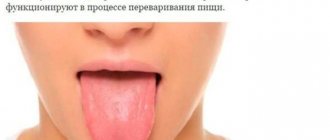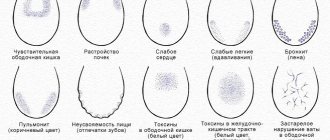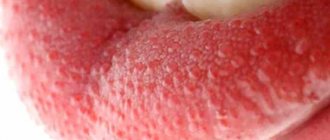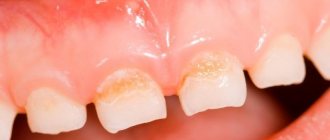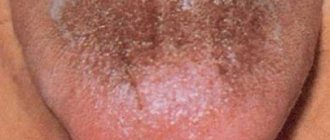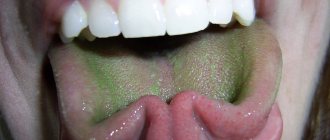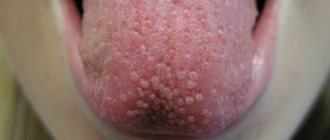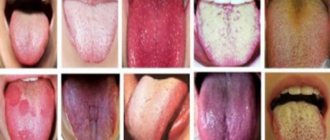Everyone has had to deal with unpleasant sensations in the mouth, but not with a burning sensation. This symptom is not very common, which is why it takes many people by surprise. The patient is not entirely clear what to do and who to contact.
There are several causes of burning in the mouth and tongue
, and in order to correctly prescribe treatment, the specialist will first have to go through all possible options, prescribe a comprehensive diagnosis and identify the disease that provoked such symptoms.
Dental causes of burning sensation in the mouth
When the first symptoms appear, you should contact your dentist, because most often the reasons are related to his profile:
- Oral candidiasis
A burning sensation in the mouth and tongue after prosthetics or filling in most cases indicates poor quality of the procedure. The dentist could damage the mucous membrane during the operation or incorrectly manufacture the prosthesis itself. Some patients are allergic to the filling composition.
- With candidiasis, the tip of the tongue stings the most, there is a feeling that the palate is burned, and there is a bitter taste. Sometimes there is pain in the throat area. The disease manifests itself due to the active proliferation of yeast fungus against a background of weakened immunity.
- Stomatitis
The cause of the disease can be glossitis. With this disease, due to the action of viruses and bacteria, the entire mucous membrane of the tongue experiences a strong burning sensation.
- Aphthous stomatitis is another disease that causes a burning sensation in the mouth. With it, small ulcers form on the mucous membrane, which hurt when touched. There is an unpleasant sensation in the mouth, like a burn from hot drinks.
What disease can cause a burning sensation in the mouth?
If there is fever and general malaise, as well as other additional symptoms, the source should be sought in more serious diseases:
- The cause of a burning sensation in the mouth and throat is sometimes hidden in disorders of the gastrointestinal tract (GIT). Most often, people suffering from colitis or pancreatitis have to deal with this symptom.
- The patient may only feel that his mouth is baking and bitter. This is how the body reacts to serious stress; in such a state, the human body can behave unpredictably.
A feeling of dryness and burning in the mouth is one of the most common signs of both types of diabetes.
- Hormonal imbalance, especially at the very beginning of menopause, can cause burning in the gums. In this case, bitterness is sometimes felt on the tongue.
- Sjögren's syndrome does not appear so often, but still it should not be written off. The disease is called dry syndrome, since for no apparent reason it causes a disruption in the secretion of external glands, which ultimately leads to xerostomia - lack of saliva.
- Sometimes an acute deficiency of nutrients, primarily folic acid and vitamin B12, leads to the symptom. Usually in such cases it is the palate in the mouth that burns.
Causes of glossalgia
Many patients with glossalgia associate the appearance of the symptom with trauma to the tongue from sharp edges of fillings or teeth with chipped enamel, as well as incorrectly installed crowns and dentures. More often, the disease appears after disorders of the autonomic nervous system. As the disease progresses, it becomes chronic.
This is a functional disorder that has no organic causes. Researchers associate its appearance with diseases of the gastrointestinal tract. Most often there is a combination of disorders of the nervous system, vascular lesions and diseases of the digestive system. A stimulating factor can be diseases that lead to a decrease in tissue sensitivity or change the response to mechanical stimuli.
Glossalgia can also develop against the background of the following diseases:
- ischemic and hemorrhagic stroke;
- encephalitis of any origin;
- neurosyphilis.
Aggravating factors may include hypovitaminosis, lack of iron, minerals, endocrine diseases, infections and autoimmune pathologies. The disease is also affected by taking certain medications - chemotherapy drugs, antihistamines, etc.
Research shows that the disease may be one of the signs of viscero-reflex bulbar syndrome, which affects the vagus and glossopharyngeal nerves. Disturbances in the transmission of nerve impulses cause glossalgia, as they lead to the appearance of false sensations. And external irritants can only intensify the symptom, which explains the high incidence of the disease in people with dentures and crowns.
Ask a Question
External reasons why it may bake in the mouth
Sometimes unpleasant sensations on the palate and tongue appear due to the occurrence of a serious illness, and it happens that the mucous membrane stings due to the influence of external factors that are easy to eliminate:
- Most often, the cause of baking in the mouth is mechanical damage to the mucous membrane.
People can injure their tongue and lips while eating; less often, poor-quality dental care leads to damage to the oral mucosa. - If the palate and tongue are burned by hot food or drinks, the discomfort will continue for at least a few more days. Sometimes the burning sensation continues after the tissue has healed.
- You may develop an allergic reaction to oral care products. For many, this symptom is caused by the presence of sodium lauryl sulfate in toothpaste. It dries out the mucous membrane, which gradually provokes itching and a feeling that the person’s whole mouth is on fire. It is better to put such pastes away.
- Taking some medications can also have unpleasant side effects. The most common causes of burning are iodine-containing medications, antihypertensive drugs when taken uncontrolled, and vasoconstrictors.
A feeling similar to that of a burn to the mucous membrane is often a side effect of chemotherapy.
Diagnosis of burning in the mouth
In most cases, burning of the oral mucosa is not at all associated with diseases of the teeth and gums. Despite this, if you feel itching, you should first contact your dentist, especially if you have recently had prosthetics or fillings done.
The specialist will examine the oral cavity and, if dental problems are detected, prescribe the necessary treatment. In addition, the dentist can give recommendations on how to eliminate dry mouth, because it is the precursor to discomfort. In this case, even traditional methods will be useful.
If the dentist was unable to cure the patient, he will have to undergo a series of tests and examinations by a neurologist, gastroenterologist, otolaryngologist and endocrinologist. First of all, blood is collected and a swab is taken from the tongue. Once the original disease is identified, the patient will be prescribed the correct treatment.
Treatment of burning sensation in the mouth and tongue
The emphasis is on eliminating the cause of the burning sensation in the mouth, but additional measures necessary to alleviate the symptoms are also prescribed.
Treating the underlying cause of pinching
If it becomes clear that the cause of the burning sensation in the mouth lies in a serious disease, first all efforts will be directed specifically at eliminating it. A therapist or specialist doctor may prescribe the following treatment:
- If an allergy is detected, the patient is prescribed antihistamines. It is recommended to completely avoid contact with the allergen.
- In case of a lack of nutrients, which has led to unpleasant sensations in the mouth and tongue, special medications are prescribed. Moreover, preference is given not to complexes, but to those products that contain only the necessary substances. In this case, these include B vitamins and folic acid.
Fungal diseases should be treated with antibiotics and disinfectant rinses.
- If problems with hormonal levels are detected, a thorough examination is first carried out, which can take more than one month. All this time, the patient is prescribed medications that relieve the burning sensation in the throat and tongue, and only at the very end are hormonal medications prescribed.
- For diabetes, medications are also recommended that can alleviate the patient’s condition. The main treatment is medication and diet, which you will have to follow for the rest of your life.
- If the mucous membranes of the mouth, tongue and lips “burn” due to stress or dry syndrome, the patient will have to visit a neurologist, and sometimes even a psychologist. Usually in such cases it is most difficult to eliminate dryness and burning, since the causes of such symptoms are not completely clear.
Treatment for burning mouth at home
Treatment is divided into two stages: addressing the underlying cause and taking steps to relieve symptoms.
One without the other will be ineffective. To relieve the patient from burning of the oral mucosa, the following recommendations are usually given:
- Regular rinsing of the mouth with diluted antiseptics: Chlorhexidine, Furacilin, Miramistin. The composition is not so important, the main thing is that the product gets rid of bacteria.
- If there are damage to the mucous membrane, it is necessary to treat them with iodine-based ointments or other drugs that promote rapid healing.
- You can get rid of a burning sensation in the mouth using ointments with an anesthetic effect. Remedies such as Kamistad and Lidocaine are excellent for pain relief.
- If your mouth is dry, the symptom can be treated with folk remedies. Rinsing with the addition of sea buckthorn oil will help best.
The list may be longer if there are other symptoms, such as fever or general malaise.
Treatment methods
Treatment of glossalgia begins with sanitation of the oral cavity: the doctor will prescribe treatment for caries, replacement of incorrectly installed dentures, as well as replacement of fillings that have expired. Making new dentures allows you to create the correct bite height. Also, at the same time, it is necessary to visit other specialists of a narrow profile - a neurologist, endocrinologist, psychotherapist, etc.
The main treatment tactic is to influence the links of the pain symptom. So, the doctor may prescribe bromine, iron, tranquilizers, and sedatives. B vitamins and lingual nerve blocks may be recommended to help restore normal function.
If the mucous membranes are dry and there is insufficient salivation, the doctor will prescribe a vitamin A solution or another product to moisturize and stimulate saliva production.
Reflexology and physiotherapeutic methods can be used as an addition to the main course of treatment. If suspiciousness, increased anxiety, or depression are present, then working with a psychotherapist is indicated.
General recommendations include the following:
- A gentle diet - eating soft foods, avoiding sour, salty, fatty foods, spices and seasonings.
- Normalization of neurological status if necessary. As prescribed by a neurologist or psychiatrist, you can take antidepressants, anti-anxiety medications, nootropics, and drugs to improve sleep.
- Psychotherapy according to indications. In some cases, good results can be achieved with the help of short-term or long-term psychotherapy.
It is important to be attentive to your psycho-emotional state. Relaxation methods, development of stress resistance, and breathing exercises may be recommended to bring the psychological state into balance.
How to prevent burning in the future
In order not to encounter a burning sensation of the tongue and oral mucosa, you need to follow preventive measures:
- Try to sleep at least 7-8 hours a day. This will protect you from stress and weakened immunity - phenomena that often provoke a feeling of heat on the mucous membrane.
- Any bad habits, be it cigarettes or alcohol, must be eliminated from your lifestyle.
- Follow the basics of proper nutrition. Include as many fresh fruits and vegetables in your diet as possible. This is useful not only for teeth and gums, but also for the gastrointestinal tract.
- Maintain good hygiene. Simply brushing your teeth regularly is not enough; you need to visit a specialist once every 6 months, use mouth rinses, dental floss and other aids.
- Pay attention to the composition of hygiene products. If you have sensitive gums and teeth, try to choose toothpastes and rinses with gentler ingredients that do not cause a burning sensation in the mouth.
- Limit your use of chewing gum. Choose only those that do not contain sugar or xylitol.
- Reduce your intake of bitter, hot and sour foods.
- Avoid treating damaged areas with products based on alcohol, potassium permanganate and brilliant green.
When you notice the first unpleasant symptoms, contact a specialist for proper diagnosis and timely treatment.
Diagnostic features
It is important to distinguish glossalgia from organic diseases of the tongue that develop as a result of injuries, neuralgia and neuritis. The doctor will also make sure that there are no bite defects. The main diagnostic criterion for glossalgia is the discrepancy between the sensations of the intensity of the impact. In addition, visible changes in the tongue and mucous membranes are almost completely absent.
In case of injuries, the pain has a clear localization and does not spread beyond the boundaries of the lesion. With neuralgia, sensations occur briefly in the area of innervation of the nerve. With neuritis, pain most often appears only on one side, and is also accompanied by sensory disturbances.
